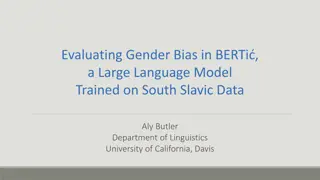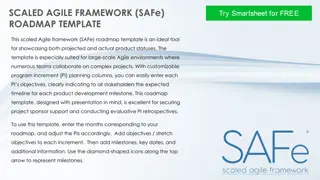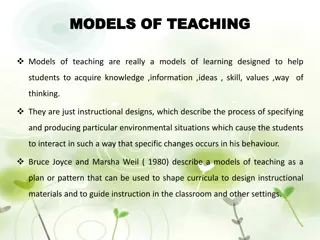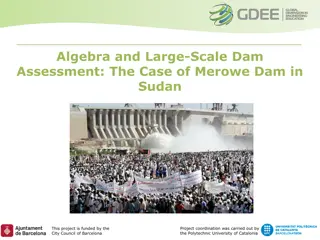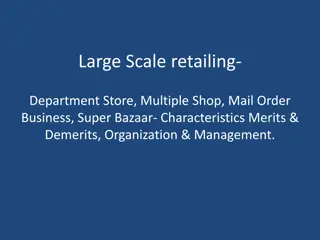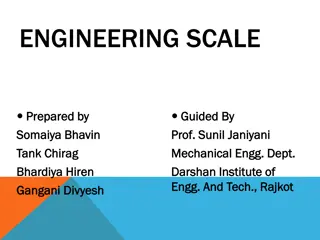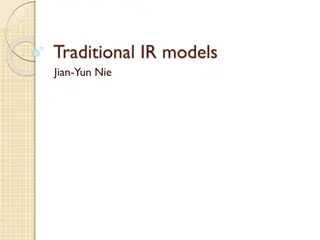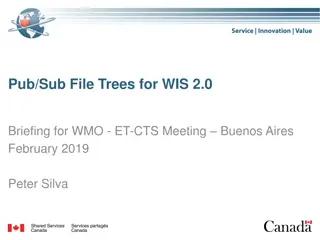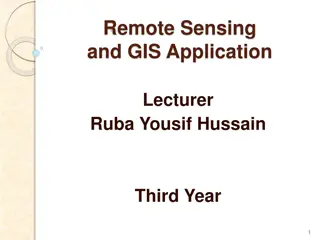Recent Advances in Large Language Models: A Comprehensive Overview
Large Language Models (LLMs) are sophisticated deep learning algorithms capable of understanding and generating human language. These models, trained on massive datasets, excel at various natural language processing tasks such as sentiment analysis, text classification, natural language inference, s
2 views • 83 slides
System Models in Software Engineering: A Comprehensive Overview
System models play a crucial role in software engineering, aiding in understanding system functionality and communicating with customers. They include context models, behavioural models, data models, object models, and more, each offering unique perspectives on the system. Different types of system
4 views • 33 slides
Evaluating Gender Bias in BERTi: Insights on Large Language Models
This study delves into gender bias evaluation in BERTi, a large language model trained on South Slavic data. It explores issues in language modeling, the impact of social biases in artificial intelligence, and training processes of Large Language Models (LLMs). Additionally, it discusses how LLMs le
11 views • 16 slides
Large Scale Structure Chapter 5
Simone Ferraro from Lawrence Berkeley National Laboratory discusses the significance of Cosmic Microwave Background (CMB) experiments in probing the large-scale structure of the universe. Covering topics like the interaction of photons with matter, CMB lensing, and CMB lensing tomography, this prese
3 views • 21 slides
Understanding Scale Factors and Ratios in Similar Figures
Explore the concept of scale factors and ratios in similar figures through visible learning intentions, warm-up exercises, and practical examples. Learn to determine the scale factor between two similar figures, use scale factors to find missing sides, and apply the knowledge in real-world scenarios
3 views • 13 slides
SAFe Roadmap Template for Large-Scale Agile Environments
This SAFe roadmap template is designed for showcasing projected and actual product statuses in large-scale Agile environments. It features customizable Program Increment planning columns to indicate objectives, timelines, milestones, and additional details. Ideal for securing project sponsor support
2 views • 4 slides
Foreign Investment in Large-scale Agriculture in the Lowlands of Ethiopia: Challenges and Paths Forward
This study focuses on the impact of foreign investment in large-scale agriculture in Ethiopia, particularly in the lowlands. It examines the actors involved, biophysical environment issues, displacement concerns, and local community empowerment. The analysis underscores the importance of meaningful
2 views • 6 slides
Introduction to Spark Streaming for Large-Scale Stream Processing
Spark Streaming, developed at UC Berkeley, extends the capabilities of Apache Spark for large-scale, near-real-time stream processing. With the ability to scale to hundreds of nodes and achieve low latencies, Spark Streaming offers efficient and fault-tolerant stateful stream processing through a si
0 views • 30 slides
Importance and Types of Scale in Architecture
Scale is crucial in architecture for accurate designs and execution. Standard scales are used in architectural drawings to set object sizes, such as human scale and miniature scale. Human scale relates to human dimensions, while miniature scale reduces object sizes. Understanding these scales enhanc
1 views • 6 slides
Understanding Models of Teaching for Effective Learning
Models of teaching serve as instructional designs to facilitate students in acquiring knowledge, skills, and values by creating specific learning environments. Bruce Joyce and Marsha Weil classified teaching models into four families: Information Processing Models, Personal Models, Social Interactio
1 views • 28 slides
Engineering Education and Large-Scale Dam Assessment: The Case of Merowe Dam in Sudan
This project, coordinated by the Polytechnic University of Catalonia and funded by the City Council of Barcelona, focuses on the global dimensions of engineering education, specifically in the context of algebra and large-scale dam assessment using the Merowe Dam in Sudan as a case study. The conten
0 views • 20 slides
Understanding Large Scale Retailing and Store Classification
Large scale retailing encompasses department stores, multiple shops, mail-order businesses, and super bazaars. It can be classified into store-based and non-store based retailing, further divided based on ownership and merchandise offered. Store-based retailers include independent retailers, chain r
1 views • 16 slides
Significance of Models in Agricultural Geography
Models play a crucial role in various disciplines, including agricultural geography, by offering a simplified and hypothetical representation of complex phenomena. When used correctly, models help in understanding reality and empirical investigations, but misuse can lead to dangerous outcomes. Longm
0 views • 8 slides
The New Trade Theory and Economies of Scale in International Trade
The New Trade Theory, emerged in the 1970s, challenges traditional trade theories by emphasizing the role of increasing returns and economies of scale in international trade. It introduces the concept of industrial organization and imperfect competition to explain how countries trade not only based
0 views • 12 slides
Enhancing Information Retrieval with Augmented Generation Models
Augmented generation models, such as REALM and RAG, integrate retrieval and generation tasks to improve information retrieval processes. These models leverage background knowledge and language models to enhance recall and candidate generation. REALM focuses on concatenation and retrieval operations,
1 views • 9 slides
Evolving Global Organizations for Agility and Scale
Explore the evolution of global organizations in the face of globalization, digital disruption, and shifting business models. Learn about designing structures for agility and scale, integrating global and local models, and navigating the complexities of the modern business landscape. The future lies
0 views • 27 slides
Understanding Acids and Bases: pH Scale Explained
Exploring the pH scale, this content delves into the fundamentals of acidity and alkalinity, covering what pH stands for, the inventor of the pH scale, reactions when acids and bases combine, and where the weakest acids and bases are found on the pH scale.
0 views • 7 slides
Parity-Only Caching for Robust Straggler Tolerance in Large-Scale Storage Systems
Addressing the challenge of stragglers in large-scale storage systems, this research introduces a Parity-Only Caching scheme for robust straggler tolerance. By combining caching and erasure coding techniques, the aim is to mitigate latency variations caused by stragglers without the need for accurat
0 views • 29 slides
TRICS Analysis for Large-Scale Development Projects
Ewan Anderson from Fore Consulting Limited discusses the application of TRICS in evaluating transportation impacts for large strategic sites like Harlow Grange and Clifton Gate. TRICS is used to estimate average person trip rates and vehicular trip rates, providing valuable insights for traffic plan
0 views • 16 slides
Taking Web Caching to the Next Level: Challenges and Solutions
Web caching plays a crucial role in improving user experience and reducing internet congestion. By implementing shared web caching on a larger scale, we can achieve significant benefits in terms of latency reduction. However, this approach comes with challenges such as efficient storage and retrieva
1 views • 20 slides
Large-Scale Sequence Alignment Techniques Overview
Lecture slides discuss key concepts, goals, challenges, and strategies for aligning long sequences, focusing on methods like suffix trees, dynamic programming, and pattern matching. The MUMmer system for finding maximal unique matching subsequences is explored along with examples of large-scale alig
0 views • 46 slides
Consultation on 2023/24 Fee Scale by PSAA: Key Points and Deadlines
PSAA is conducting a crucial consultation to set the fee scale for 2023/24, involving elements like audit fees, legal framework, and consultation details with stakeholders. The process includes setting scale fees, handling fee variations, adhering to statutory roles, and addressing the audit backlog
0 views • 30 slides
Engineering Scale and Different Types of Scales
Engineering scale plays a crucial role in reducing or enlarging dimensions of large or tiny objects to fit standard size drawing sheets. This article covers the concept of reducing scale, representative factor, types of scales like plain, diagonal, vernier, and more, along with detailed construction
0 views • 11 slides
Understanding Scale Factors and Similar Shapes in Graphic Design
Graphic artists often need to resize shapes for different purposes while ensuring they maintain their original proportions. This involves determining the scale factor between similar shapes, understanding how to find the scale factor using corresponding sides, and dealing with scenarios where sides
0 views • 8 slides
Understanding Horizontal Boundaries of Firms in Economics
Exploring the concept of horizontal boundaries in firm behavior, this lecture delves into Long-run Average Cost curve, economies and diseconomies of scale, optimal plant size, and the Minimum Efficient Scale. It discusses how economies of scale affect production costs and the relationship between ma
0 views • 25 slides
WMO Scale of Assessment and Working Capital Fund
The WMO Scale of Assessment for members' contributions and the Working Capital Fund is based on the United Nations Scale, adjusted for differences in membership every 3 years. The latest scale approved by EC-75 for 2023 uses the UN scale from December 2021. The rates for 2026-2027 will be determined
0 views • 9 slides
Understanding Information Retrieval Models and Processes
Delve into the world of information retrieval models with a focus on traditional approaches, main processes like indexing and retrieval, cases of one-term and multi-term queries, and the evolution of IR models from boolean to probabilistic and vector space models. Explore the concept of IR models, r
0 views • 65 slides
Understanding Cross-Classified Models in Multilevel Modelling
Cross-classified models in multilevel modelling involve non-hierarchical data structures where entities are classified within multiple categories. These models extend traditional nested multilevel models by accounting for complex relationships among data levels. Professor William Browne from the Uni
0 views • 13 slides
Understanding Pressure Ulcer Risk Assessment with the Braden Scale
Pressure ulcer risk assessment is crucial in healthcare settings to identify individuals at risk of developing pressure ulcers. The Braden Scale, developed in 1984, evaluates six key elements contributing to pressure ulcer development. It provides a standardized method for assessing risk levels base
0 views • 20 slides
Case Study on Web-Scale Natural Language Processing for URL Word Breaking
Explore how web-scale NLP techniques are applied to break down URLs into words effectively. Various models and evaluations are discussed to address the challenges of handling diverse language styles and the need for matched data to ensure accuracy in different languages. The study emphasizes the imp
0 views • 21 slides
Understanding Zero-Shot Adversarial Robustness for Large-Scale Models
Pretrained large-scale vision-language models like CLIP show strong generalization on unseen tasks but are vulnerable to imperceptible adversarial perturbations. This work delves into adapting these models for zero-shot transferability in adversarial robustness, even without specific training on unk
0 views • 18 slides
Application of Large-Scale Gas Electron Multiplier Technology to Digital Hadron Calorimetry by Andy White
Andy White from the University of Texas at Arlington presented on the application of Large-Scale Gas Electron Multiplier (GEM) technology to digital hadron calorimetry at the SiD Workshop in SLAC 2012. The study focuses on developing precision calorimetry for future accelerators using Double GEM lay
0 views • 36 slides
Comparing Scale-Up vs. Scale-Out in Cloud Storage and Graph Processing Systems
In this study, the authors analyze the dilemma of scale-up versus scale-out for cloud application users. They investigate whether scale-out is always superior to scale-up, particularly focusing on systems like Hadoop. The research provides insights on pricing models, deployment guidance, and perform
0 views • 27 slides
Understanding Composite Models in Building Complex Systems
Composite models are essential in representing complex entities by combining different types of models, such as resource allocation, transport, and assembly models. Gluing these models together allows for a comprehensive representation of systems like the milk industry, where raw materials are trans
0 views • 27 slides
Effective Data Transport Strategies for Large-Scale Operations
Explore strategies for efficient data transport in large-scale operations, emphasizing moving towards more extensive data types, ensuring security, transparency, and manageability. Detailing transport options like (S)FTP(s) and HTTP(s) while prioritizing simplicity and flexibility. Considerations fo
0 views • 32 slides
Remote Sensing and GIS Applications in Photogrammetry: Understanding Scale Variations
Exploring the fundamental principles of photogrammetry in remote sensing and GIS applications, this content delves into the science of measurements from aerial photographs. It discusses the implications of scale differences on maps and aerial photographs, emphasizing the variations in scale due to t
0 views • 19 slides
PrEP Scale Up in Kenya: Bridge to Scale Project Overview
PrEP Scale Up in Kenya: Bridge to Scale Project sessions in 2017 discussed the National HIV Prevalence, PrEP journey, TWG composition, milestones, sub-committees, and outputs focusing on scaling up PrEP as an effective HIV-prevention intervention.
0 views • 20 slides
Understanding Scale Drawings and Compass Points
Learn to interpret information from problems, create scale drawings, solve real-life problems using scale drawings, understand compass points, and follow directions accurately. Practice solving problems involving scale drawings, bearings, compass points, and map directions to enhance your spatial sk
0 views • 19 slides
Efficient Bitruss Decomposition for Large-scale Bipartite Graphs
Bitruss decomposition is a powerful concept in graph theory to identify cohesive subgraphs in bipartite graphs. This paper by Kai Wang, Xuemin Lin, Lu Qin, Wenjie Zhang, and Ying Zhang presents an efficient approach for computing bitruss numbers of edges in large-scale bipartite graphs. The study ex
0 views • 25 slides
Scale Learning Adventures: Movie Magic and Visible Learning
Embark on a journey of scale learning through engaging activities such as Butterfly Scale Warm-up, Hobbit Holes and Hogwarts exploration, and applying knowledge at Hagrid's Shack. Discover how scale is used in real-life situations and solve problems using ratios with success criteria in mind.
0 views • 10 slides


